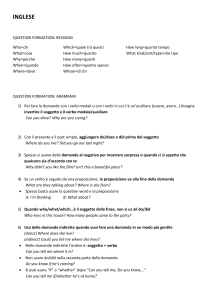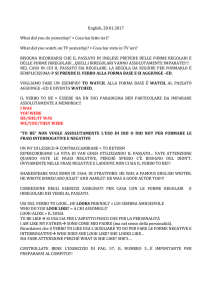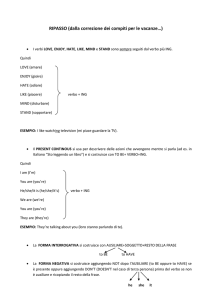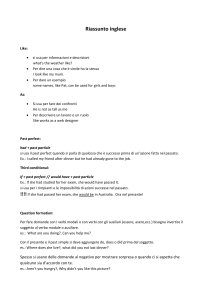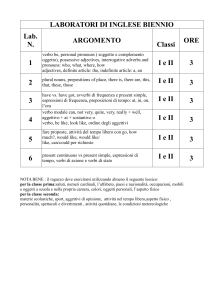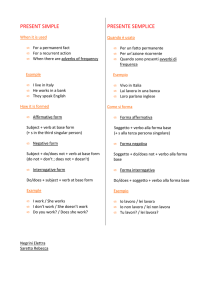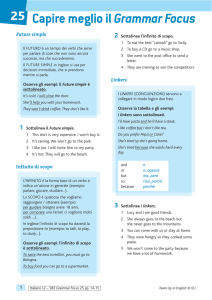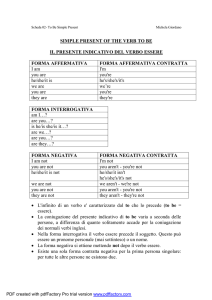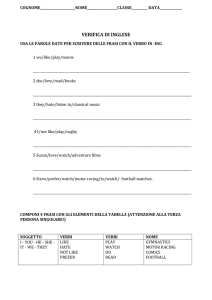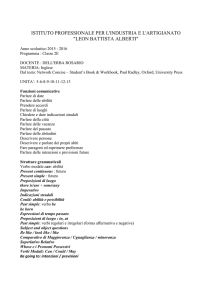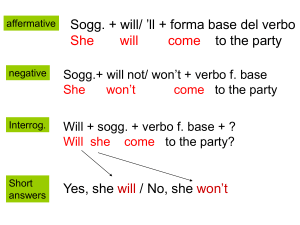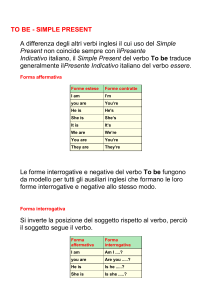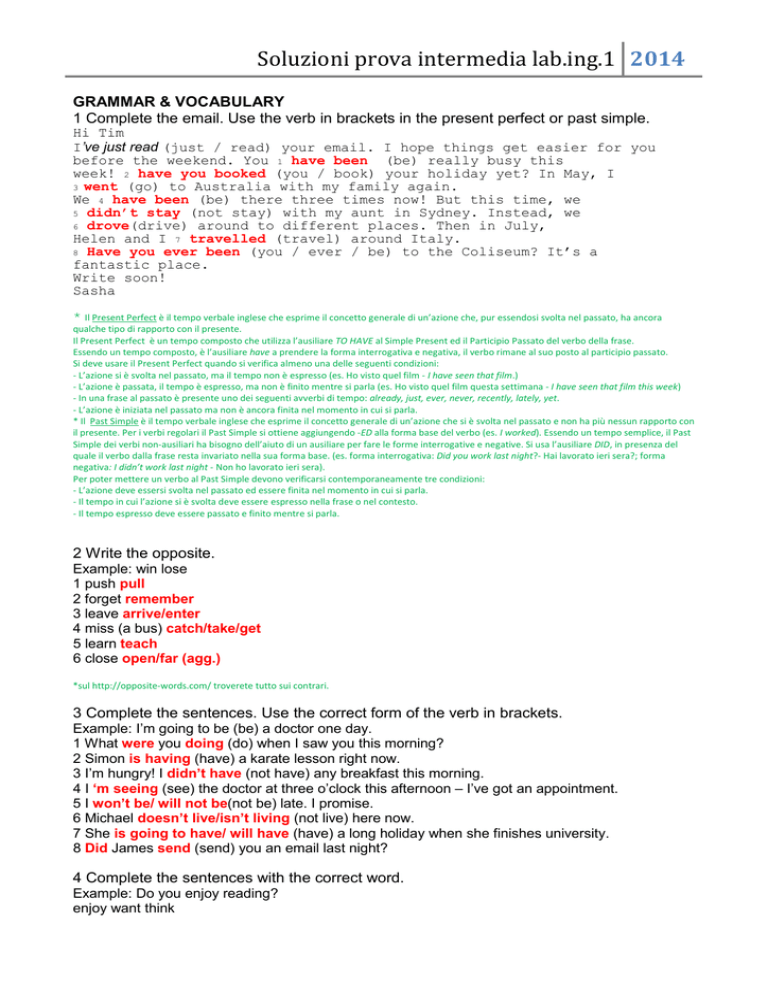
Soluzioni prova intermedia lab.ing.1 2014
GRAMMAR & VOCABULARY
1 Complete the email. Use the verb in brackets in the present perfect or past simple.
Hi Tim
I’ve just read (just / read) your email. I hope things get easier for you
before the weekend. You 1 have been (be) really busy this
week! 2 have you booked (you / book) your holiday yet? In May, I
3 went (go) to Australia with my family again.
We 4 have been (be) there three times now! But this time, we
5 didn’t stay (not stay) with my aunt in Sydney. Instead, we
6 drove(drive) around to different places. Then in July,
Helen and I 7 travelled (travel) around Italy.
8 Have you ever been (you / ever / be) to the Coliseum? It’s a
fantastic place.
Write soon!
Sasha
* Il Present Perfect è il tempo verbale inglese che esprime il concetto generale di un’azione che, pur essendosi svolta nel passato, ha ancora
qualche tipo di rapporto con il presente.
Il Present Perfect è un tempo composto che utilizza l’ausiliare TO HAVE al Simple Present ed il Participio Passato del verbo della frase.
Essendo un tempo composto, è l’ausiliare have a prendere la forma interrogativa e negativa, il verbo rimane al suo posto al participio passato.
Si deve usare il Present Perfect quando si verifica almeno una delle seguenti condizioni:
- L’azione si è svolta nel passato, ma il tempo non è espresso (es. Ho visto quel film - I have seen that film.)
- L’azione è passata, il tempo è espresso, ma non è finito mentre si parla (es. Ho visto quel film questa settimana - I have seen that film this week)
- In una frase al passato è presente uno dei seguenti avverbi di tempo: already, just, ever, never, recently, lately, yet.
- L’azione è iniziata nel passato ma non è ancora finita nel momento in cui si parla.
* Il Past Simple è il tempo verbale inglese che esprime il concetto generale di un’azione che si è svolta nel passato e non ha più nessun rapporto con
il presente. Per i verbi regolari il Past Simple si ottiene aggiungendo -ED alla forma base del verbo (es. I worked). Essendo un tempo semplice, il Past
Simple dei verbi non-ausiliari ha bisogno dell’aiuto di un ausiliare per fare le forme interrogative e negative. Si usa l’ausiliare DID, in presenza del
quale il verbo dalla frase resta invariato nella sua forma base. (es. forma interrogativa: Did you work last night?- Hai lavorato ieri sera?; forma
negativa: I didn’t work last night - Non ho lavorato ieri sera).
Per poter mettere un verbo al Past Simple devono verificarsi contemporaneamente tre condizioni:
- L’azione deve essersi svolta nel passato ed essere finita nel momento in cui si parla.
- Il tempo in cui l’azione si è svolta deve essere espresso nella frase o nel contesto.
- Il tempo espresso deve essere passato e finito mentre si parla.
2 Write the opposite.
Example: win lose
1 push pull
2 forget remember
3 leave arrive/enter
4 miss (a bus) catch/take/get
5 learn teach
6 close open/far (agg.)
*sul http://opposite-words.com/ troverete tutto sui contrari.
3 Complete the sentences. Use the correct form of the verb in brackets.
Example: I’m going to be (be) a doctor one day.
1 What were you doing (do) when I saw you this morning?
2 Simon is having (have) a karate lesson right now.
3 I’m hungry! I didn’t have (not have) any breakfast this morning.
4 I ‘m seeing (see) the doctor at three o’clock this afternoon – I’ve got an appointment.
5 I won’t be/ will not be(not be) late. I promise.
6 Michael doesn’t live/isn’t living (not live) here now.
7 She is going to have/ will have (have) a long holiday when she finishes university.
8 Did James send (send) you an email last night?
4 Complete the sentences with the correct word.
Example: Do you enjoy reading?
enjoy want think
Soluzioni prova intermedia lab.ing.1 2014
1 Mike’s interested in fishing.
interested excited happy
2 She spends a lot of time watching TV.
has spends does
3 I’d like to go out this evening.
mind think like
4 I’ve stopped talking to him.
done stopped dreamed
5 I usually drive to work because it saves time.
gives makes saves
6 I’m not doing the washing up again! It’s your turn.
making doing cleaning
7 I met James last night and we talked about getting married.
told said talked
8 Can you pay me back the money I lent you?
call take pay
READING
Looking for love
Looking for Love is an agency that finds partners for single people of any age. Read about Lisa.
My name’s Lisa. I’m 25 years old and I’m from Manchester. I’m single and I’m looking for love.
I’m a journalist on a local newspaper, which means I write stories about local issues and sometimes I
interview politicians. I like my job, but I’d like to work on a national newspaper one day. That’s because I
want to have the opportunity to work abroad.
I have a small group of friends who I’ve known for years. I even went to school with some of them! I’m not
really extrovert but I do like going out and having fun. We usually go out to parties, nightclubs, and
restaurants. I also like cooking and I make great pasta! My ideal night in is a good meal, a glass of wine, and
a DVD. I like thrillers much more than I like romantic comedies!
I’m not very sporty, but I like to keep fit. I stopped smoking last year and now I go running twice a week and I
sometimes go to the gym at weekends. I eat lots of fruit and vegetables and I try not to have red meat or too
much coffee. At work, I drink water or tea.
I prefer men who are interested in serious issues because I like talking about politics and what’s happening
in the world. However, I also like men with a good sense of humour. These characteristics are more
important to me than physical appearance.
Please contact Looking for Love if you think you’re the kind of person I’m looking for!
1 Read the article and tick (_) A, B, or C.
1 Lisa often has to B - talk about politics.
A interview politicians in other countries B talk about politics C travel abroad
2 Lisa met all her friends A - a long time ago.
A a long time ago B four years ago C at school
3 Lisa is B - a good cook.
A extrovert B a good cook C very funny
4 Lisa doesn’t like C - romantic stories.
A staying at home B alcohol C romantic stories
5 Lisa B - goes jogging every week.
A goes to the gym B goes jogging C plays sport
6 Lisa often has B - fruit.
A coffee B fruit C red meat
7 Lisa prefers A - funny men.
A funny B hard-working C attractive
2 Read the article again. Are the sentences true (T) or false (F)?
Example: Looking for Love is an organization for young people. F
1 Lisa wants to work for a different newspaper. T
Soluzioni prova intermedia lab.ing.1 2014
2 She doesn’t know any of her friends from school. F
3 She thinks she is shy. F
4 She enjoys watching romantic films. F
5 She never takes exercise at the weekend. F
6 She used to smoke. T
7 She drinks a lot of tea. T
8 She hates talking about serious things. F
WRITING
Write an article for the Looking for Love website. Write 100–150 words, including (1) your
personal
information, (2) your occupation, (3) your hobbies
* Lo scritto viene valutato secondo 5 parametri:
- grammatica (com’è la struttura grammaticale, come sono le frasi – la lunghezza, l’ordine e la formazione delle parole)
- vocabolario (varietà, ricchezza del vocabolario, italianismi, falsi amici, idioms; vocabolario appropriato, collocazione)
- punteggiatura e ortografia
- contenuto e l'organizzazione
- stile

